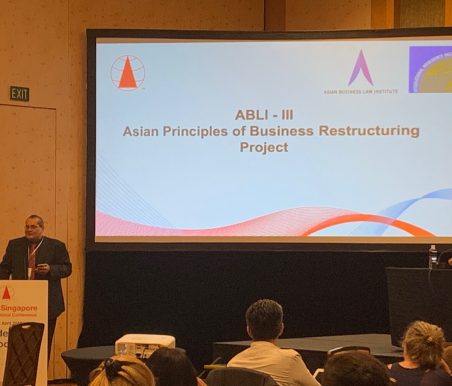[Update] Suspension of filing of insolvency proceedings under the Insolvency and Bankruptcy Code has been extended for another three months to the end of 2020.
Among all jurisdictions covered by ABLI’s Asian Principles of Business Restructuring Project, India may be said to have mounted the most drastic insolvency response to Covid-19, culminating in a six-month suspension of the application of the Insolvency and Bankruptcy Code (IBC) to defaults arising on or after March 25, 2020 as introduced by the Insolvency and Bankruptcy Code (Amendment) Ordinance 2020. In addition, the Ministry of Corporate Affairs also raised the threshold for initiating the corporate insolvency resolution process (CIRP) under IBC by 100 times, from INR 1 Lakh (approximately USD 1,360) to INR 1 Crores (approximately 136,000).
Further, the same Ordinance mentioned above also suspended the filing of an application against a director of a company where the IBC process is suspended if the director knew or ought to have known that there was no reasonable prospect of avoiding the commencement of a CIRP process under section 66(2)(a) of the IBC. In essence, this amendment has suspended the insolvent trading liability of directors.
India is among the countries that have introduced strict lock-down measures early on during this pandemic. While many of those measures are gradually being relaxed, their impact on business operations has already been keenly felt. In response, the Insolvency and Bankruptcy Board of India made it clear that the period of Covid lockdown imposed by the Central Government should not be counted for the purpose of the timeline in a CIRP process for any activity that could not be completed due to such lockdown. In a similar move, the National Company Law Appellate Tribunal, which hears cases under the IBC, also announced the exclusion of the lock-down period for the purpose of CIRP timelines.
More generally, the Reserve Bank of India, the nation’s central bank, announced a Covid-19 Regulatory Package which includes a three-month debt moratorium and payment rescheduling, among other measures.
Pulkit Gupta, Director of EY Restructuring LLP and author of the India report in ABLI’s Corporate Restructuring and Insolvency in Asia, expected a possible slow-down of activities for a few months after the IBC moratorium ends (if as scheduled) at the end of September because “banks will try to work out out-of-court restructuring arrangements with debtors”. Debtors who are unable to reach such arrangements with their lenders will see insolvency actions. “In my view, that momentum will pick up early next year. Sector wise, airlines, hospitality and real estate would be some of the worst affected.” commented Pulkit.
Read Pulkit’s India report of Corporate Restructuring and Insolvency in Asia here. For more details of the measures mentioned above, read the PDF below.
Cover photo credit: Financial Express

![[Interview] Landmark Indonesian Recognition [Interview] Landmark Indonesian Recognition](https://abli.asia/wp-content/uploads/elementor/thumbs/Interview-Landmark-Indonesian-Recognition-r77cnxouwhwh3r5ch7omm9j9804fq32n59ungqj82o.jpg)
![[Interview] What is Happening [Interview] What is Happening](https://abli.asia/wp-content/uploads/elementor/thumbs/Interview-What-is-Happening-r77ahqi8boup7mqk3wszohxq2zk4clmk27zf50hbq8.jpg)




